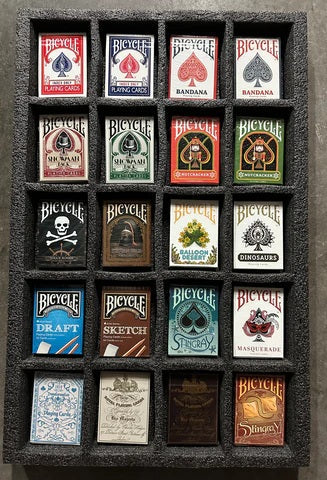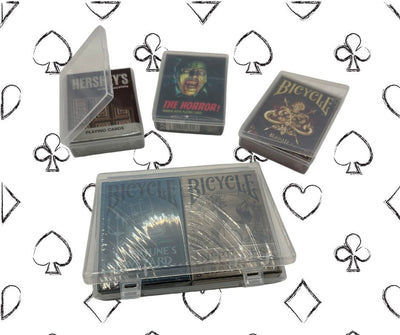Lately I've been spending a lot of time around young teenagers and kids learning magic for the very first time. I'm already getting them connected with good resources that teach them how to perform tricks. But what advice and guidance should I be giving them more generally?
To begin with, it is important that budding magicians are familiar with some of the ethics of magic. Sometimes referred to as "the magician's code", it's a well-known rule that as a magician you should never reveal your secrets. Why? Because by giving away the method of a trick, you're taking away the very thing that makes magic astonishing and amazing: the unknown. Did you tell someone the secret behind a trick you've just performed? You're actually hurting your magic, and you've stripped it of the ability to surprise and entertain. Now that shouldn't stop you sharing secrets with someone genuinely interested in performing magic. When you have a love for the art of magic, you will want to nurture serious students of magic, and encourage and assist fellow magicians!
But this ethical guideline is common knowledge, and is geared to protect the art of magic more generally, and to ensure that your own magic amazes. Besides this basic rule, what other tips and guidelines would you give a newcomer to magic, to help them improve? Here are 10 suggestions to get new magicians started. Hopefully they'll also serve as a useful refresher for old-timers, and a reminder of what is really important about magic!
1. Do realize that your presentation is as important as your moves
In fact, good presentation probably even more important than technique - important as that is! Magic isn’t about creating a sophisticated puzzle, or challenging your spectator with a mere impossibility. Learning the techniques and moves required to do a particular effect is just the first step to successfully performing it. In addition you need to be able to present it in a way that is interesting and engaging to watch. Never forget that magic is an art-form that has the goal of entertaining, and that's why good showmanship is essential. You you already have some magic experience under your belt, and know a good range of tricks? Then do yourself a favour by reading some books on the subject of showmanship and magic design. Good examples are Strong Magic and Designing Miracles by Darwin Ortiz.2. Do say something when you perform
Some magicians can get away with silent acts, but for most of us, our voice is another prop that we'll want to make good use of in the course of a magic trick. What you say (in magician speak we call this "patter") is just as important as what you do. So it is important to practice your patter just as much as you practice your moves and sleight of hand. Many magicians will even recommend writing down a script for everything you say, memorizing and rehearsing it. Even if you don't go quite that far, it is important to realize how big a role the words that accompany a magic trick are. Give them careful thought, so that they help disguise the method and enhance the effect. Well chosen words will greatly help your magic be more entertaining.3. Do focus on simple and self-working tricks
One of the best ways that newcomers to magic can work on their presentation is by starting with simple tricks, such as self-working card tricks. Don't make the mistake of thinking that self-working means weak or boring! Some of the most famous card tricks in the world are self-working, such as Paul Curry's oustanding "Out of This World". Learn tricks that don't require complex manipulation. Then you can really focus on the presentation, and make them thoroughly entertaining. You can always work on building up your sleight of hand later.4. Do practice, practice, practice
A poorly practiced routine does the art of magic a disservice. More importantly, it's not very likely to amaze or astonish, because your performance will be lacking. A professional going through his routine might look casual and natural. But you can be sure that very little about what you're seeing is being spontaneously ad-libbed on the spur of the moment. A successful and polished performer is exactly that: well polished. You need to be able to do the moves and techniques required without thinking about them. Also, you need to know exactly what you are going to say. If you haven't practiced these things, your mind will be working over-time, trying to remember what to say and do. Good magic has a high degree of interaction and engagement with your spectators. How do you do this while creating a convincing and entertaining illusion that hides the secret? Here's how: you need to have practiced a lot before performing. The more you practice, the better you'll get, and you'll only enjoy your magic all the more!5. Do make it seem impossible
Ultimately good magic is about creating the illusion of something impossible. The more impossible it seems, the stronger it is. Of course it isn't actually impossible - after all, if it was then you wouldn't be able to do it! But you want to perform a trick in a way so that any possible explanation is eliminated. So think carefully about what might be going on in the mind of your spectator. If they can think of a possible method of accomplishing what they've seen, even if it's not the method you used, they won't be amazed. Do they think that you've stacked the deck? Then let them shuffle the deck first. Do they think the cards are marked? Then let them examine them. Do they think you have a card hidden in your hand? Then show your hand empty. Anticipate their thinking, and deliberately disprove those methods as you go along. That's how you'll create greater astonishment!
6. Don’t learn too much
When learning magic, it's easy to make the mistake of taking on too much. In that sense magic is no different than many other passions in life. When you first discover a passion, the temptation is to buy everything you can, and do everything at once. But to become really good at magic, you need to be disciplined and selective. It is vital to present your material well, so you want to give yourself the opportunity to become a true master of whatever it is that you are performing. The classic book Expert Card Technique offers this invaluable advice: "Those new to card conjuring would do well if, instead of attempting to learn a great number of tricks, they would instead concentrate upon a few good tricks and master them so that their technique and their presentation is so excellent that those who see them will want to see them again."
7. Don't buy tons of tricks
Whenever you're enthusiastic about something, it's easy to indulge your passion by spending money on it. And in magic, it's really not difficult to find things to spend your hard earned money on. Magic creators are only too happy to take your money. Trust me, the latest and greatest tricks might all look good, but they don't always deliver on what they promise. Don't spend your money on one trick after another, but realize that most of these will eventually be collecting dust in a drawer somewhere. In fact, it can be a good move instead to start by focusing on classics that have been tried and tested over time. With a couple of decks of cards and a good teaching resource, you can get a lot of mileage, especially if you're just starting your adventure into magic. In the end it's more fun to master and improve something you already know, and to learn something from what you already have. That's better than to be constantly spending money and trying new things. Magic doesn't have to be expensive, and you may even improve more quickly if you aren't buying the latest and greatest on a regular basis! Of course, once you have a solid foundation in magic, you can explore the latest and greatest effects - but they are usually not the best place to start.
8. Do get some good books or DVDs
As a student of magic, do yourself a big favour and learn from the best. Sure, you can head to youtube, and start binging on card trick tutorials you find there. Unfortunately, a lot of magic on youtube is mediocre. It is often performed by untrained teenagers who have learned what they know from other untrained teenagers. You'll learn bad habits and bad technique. And perhaps most importantly, you won't learn the thing that arguably matters the most: good presentation. Even a basic trick in the hands of a professional magician can look amazing if well presented. But a stunning trick taught badly won't impress anyone. So if you want to progress, learn from a real magician, and get some good books and DVDs that will teach you how to do things properly. It's a small investment, but one that you won't regret. Spending a little money on some good teaching materials is better than spending a fortune on more tricks.
9. Do watch performances by professionals
One of the best way to learn how to present magic well is by watching experts doing their thing. This is something different than the previous tip, because I'm not talking here about teaching materials that explain how to do tricks. But by watching a pro perform, you'll learn a great deal about presenting magic and being entertaining. Only by knowing what good magic looks like will you be able to strive for this in your own performances. The more you watch, the more you will subconsciously absorb different techniques. And you will get ideas for patter, and develop your own ability as a magician. Fortunately you can readily find this kind of material online, and much can be learned from it. Watch shows like Penn and Teller, or dig up clips by master magicians like Tommy Wonder and Juan Tamariz. In the process you'll be growing - as well as being entertained by the best!
10. Don't copy cat
As a beginner, it's easy to make the mistake of copying everything that you see on a magic video. When you're just starting out, this doesn't matter too much. It's a natural thing that happens, because you're learning everything from scratch. But it is important to realize that you need to develop your own persona and style. Not every magician's style will be right for you, and just because it works for them, doesn't mean it will be a good fit for you. So you'll have to adjust your patter and presentation to fit your own personality and style. Rather than just parrot everything you see, by becoming a clone and imitator, try to be comfortable with who you are, and develop your own style.
Finally, remember to have fun! If you’re no longer enjoying magic, take a break. Magic isn’t for everyone, and that’s okay! And if you are getting frustrated because something isn't working or going as well as you'd like, put it away and come back to it on another day. In the end, it doesn't just have to be fun for your audience, but also for you.
Magic can be incredibly rewarding. The more effort you put into honing your craft, the more satisfying it will become for you and for those who have the privilege of seeing you perform. Let me quote again from the Expert Card Technique book, which cites David Devant. "One trick, well done, is of greater value than a dozen tricks performed in a slipshod manner." So go out there and master that trick, and amaze!
Where to learn? If you're interested in learning card magic, I highly recommend the terrific videos from Big Blind Media with Self-Working Card Tricks and Easy-To-Do Card Tricks. Also see our previous articles on How to Get Started in Card Magic and Recommended Resources for Beginners in Card Magic.
About the writer: EndersGame is a well-known and highly respected reviewer of board games and playing cards. He loves card games, card magic, cardistry, and card collecting, and has reviewed several hundred boardgames and hundreds of different decks of playing cards. You can see a complete list of his game reviews here, and his playing card reviews here. He is considered an authority on playing cards and has written extensively about their design, history, and function, and has many contacts within the playing card and board game industries. You can view his previous articles about playing cards here. In his spare time he also volunteers with local youth to teach them the art of cardistry and card magic.





